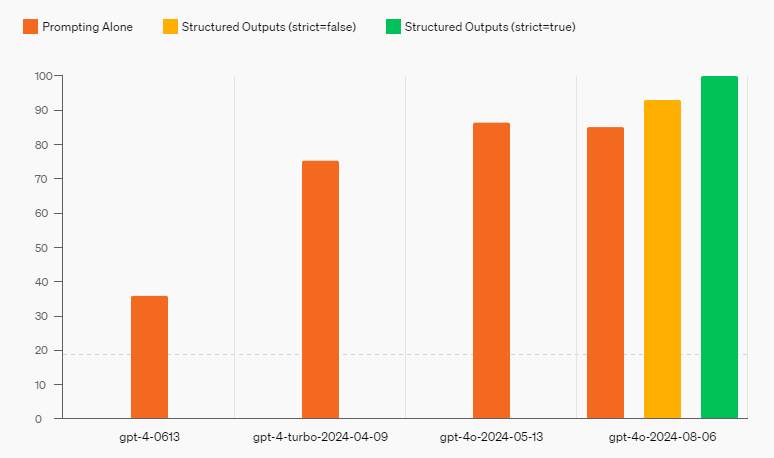Leveraging JSON Structured Outputs for Reliable Data
The advancement of AI technology today is truly remarkable. The introduction of the new ‘structured outputs’ feature in OpenAI’s API has developers buzzing with excitement. This feature allows AI model outputs to be strictly aligned with developer-provided JSON schemas, making complex data tasks easier than ever before.
As you may already know, extracting essential information from unstructured data is one of the most crucial use cases of AI. However, [the limitations and inconveniences of traditional methods] have always existed. The new structured outputs feature from OpenAI addresses these issues, providing developers with a much more powerful tool.
Why Structured Outputs Matter in the API
First, let’s understand why structured outputs are important. Previously, aligning AI model outputs to a specific format required open-source tools, prompt adjustments, or even multiple retries. But now, developers can restrict model outputs to match their provided JSON schema. This allows developers to [obtain more reliable results] and handle complex data processing tasks much more efficiently and accurately.
How to Use Structured Outputs in the OpenAI API
So, how can you use structured outputs? OpenAI offers various tools for this purpose. In Python and Node SDKs, you can provide Pydantic or Zod objects to convert them into JSON schemas, automatically serializing and parsing JSON responses. These features make it easier for developers to use structured outputs.
For example, structured outputs through function calls can be used in all supported models by setting [strict: true]. This ensures accurate responses aligned with complex JSON schemas, making tasks like data retrieval, question answering, and data extraction more reliable.
Performance Evaluation and Safe Structured Outputs
OpenAI’s new feature shows significant improvements in performance. In evaluations requiring adherence to complex JSON schemas, the new gpt-4o-2024-08-06 model [scored a high 100%]. This is a marked improvement compared to the previous gpt-4-0613 model, which scored below 40%.

Additionally, this feature complies with OpenAI’s existing safety policies and can reject unsafe requests. The API response includes a refusal string value, allowing you to programmatically detect when the model generates a rejection. In this way, OpenAI’s structured outputs feature [ensures both safety and reliability].
Conclusion: Advancing AI’s Future with JSON Structured Outputs
If you’ve read this far, you understand the importance of this new feature. With the introduction of JSON structured outputs in OpenAI’s API, developers now have a more powerful tool at their disposal. The era of easily extracting essential information from unstructured data and aligning AI outputs with specific formats is here.
Take advantage of this feature yourself. By leveraging more reliable AI development, you can maximize the efficiency of your data tasks. Start using OpenAI’s API today and take your projects to the next level.
Reference: OpenAI, [“Introducing Structured Outputs in the API”](https://openai.com/index/introducing-structured-outputs-in-the-api)
